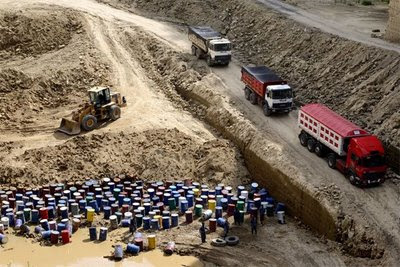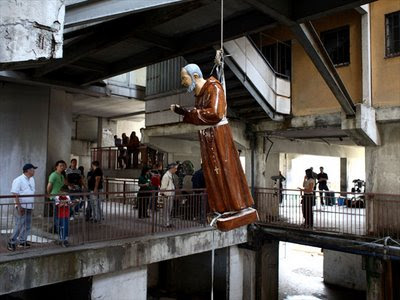Out of Frame: Gomorra
 During a school trip to see Greek and Roman ruins in southern Italy last summer, we spent several days in and near Naples. We did not stay in Naples, for both convenience -- most of the sites we visited are outside the city -- and unease at exposing students to the city's risks. You may recall that last summer was the height of the garbage crisis in Naples. Because the city's household waste disposal system ground to a halt, bags of garbage were piling up in the streets. As summer came and the temperature rose, the stench became unbearable and people began to light the piles of garbage on fire. When police and fire companies came to put the fires out, residents threw rocks at them and worse.
During a school trip to see Greek and Roman ruins in southern Italy last summer, we spent several days in and near Naples. We did not stay in Naples, for both convenience -- most of the sites we visited are outside the city -- and unease at exposing students to the city's risks. You may recall that last summer was the height of the garbage crisis in Naples. Because the city's household waste disposal system ground to a halt, bags of garbage were piling up in the streets. As summer came and the temperature rose, the stench became unbearable and people began to light the piles of garbage on fire. When police and fire companies came to put the fires out, residents threw rocks at them and worse.
Our tour guide, who was not from Naples, and our bus driver, who was a native Neapolitan, both blamed the garbage crisis on the Camorra, the infamous Neapolitan mafia. According to them, the Camorra controlled the city's garbage dumps and took money from other cities in Italy and around Europe, to put their garbage in the Neapolitan dumps. Soon there was no place for Neapolitan garbage to be taken. As reported on NPR, author Roberto Saviano claims that the problem goes much deeper. His book, Gomorra, was adapted (by director Matteo Garrone, Saviano, and a daunting committee of screenwriters) into a disturbing movie of the same name, made in 2008 but just recently released in the United States. It won the Grand Prix at Cannes last year and and has been praised to the skies by just about every film critic whose opinion I respect. Naturally, it did not even make the shortlist for the Best Foreign Film Academy Award, even though it did win the Golden Globe in that category.
Washington Post | Los Angeles Times | San Francisco Chronicle | New York Times | Wall Street Journal | Roger Ebert | Anthony Lane | The Guardian | DCist | Rotten Tomatoes
The film follows several strands of the Camorra's most infamous crimes: the sale of drugs in the desperate assisted housing projects of Scampia (one of the most notorious drug markets in Europe), the intimidation and assassination of gang rivals and their families, the counterfeiting of haute couture designs, the brutal control of business interests, and worst of all, the illegal dumping and burial of toxic waste on farms and other land. Garrone has made possibly the least glamorous, most authentic mob film ever, casting many real Neapolitans in minor roles and taking the gritty, bleak, often hand-held camera into the Naples and Campania that few get to see. The opening sequence, an unexplained multiple assassination in a tanning salon, is bathed in a blue, otherworldly glow, the victims in their booths resembling time travelers in space ships. Indeed, Gomorra takes place in another world, the dialogue authentically peppered with so much Neapolitan dialect that it was generally impossible for me, with my middling Italian, to follow and was reportedly even difficult for many native Italians not from Naples. What is so depressing about the film is how inevitable the Camorra is in the lives of the people shown. The conflicts are all between rival gangs within a loosely confederated organization: the police and the government are glimpsed from time to time but rarely even figure in the calculation. In the grandest gesture of irony, elder Camorra bosses seem the most moral actors in the story, reluctantly accepting the necessity of assassinating two young knuckleheads who have stolen their cache of weapons or justifying the poisoning of land with toxic waste as a way to relieve Italians of their debts. This certainly fits with how our bus driver described the Camorra, so deeply embedded in Neapolitan society that they function mostly out of underground tunnels and bunkers, a second city underground for the black market. As this man put it, even if the police were willing to try to take on the Camorra, it would require much greater firepower than they or anyone else had (not even the U.S. Marines, as he put it). Perhaps now that the Camorra is even interfering with the production and sale of food, the thing most sacred to all Italians, it has gone too far.
What is so depressing about the film is how inevitable the Camorra is in the lives of the people shown. The conflicts are all between rival gangs within a loosely confederated organization: the police and the government are glimpsed from time to time but rarely even figure in the calculation. In the grandest gesture of irony, elder Camorra bosses seem the most moral actors in the story, reluctantly accepting the necessity of assassinating two young knuckleheads who have stolen their cache of weapons or justifying the poisoning of land with toxic waste as a way to relieve Italians of their debts. This certainly fits with how our bus driver described the Camorra, so deeply embedded in Neapolitan society that they function mostly out of underground tunnels and bunkers, a second city underground for the black market. As this man put it, even if the police were willing to try to take on the Camorra, it would require much greater firepower than they or anyone else had (not even the U.S. Marines, as he put it). Perhaps now that the Camorra is even interfering with the production and sale of food, the thing most sacred to all Italians, it has gone too far.
In the Washington area, Gomorra is playing exclusively at the Landmark Bethesda Row cinema.





















































No comments:
Post a Comment